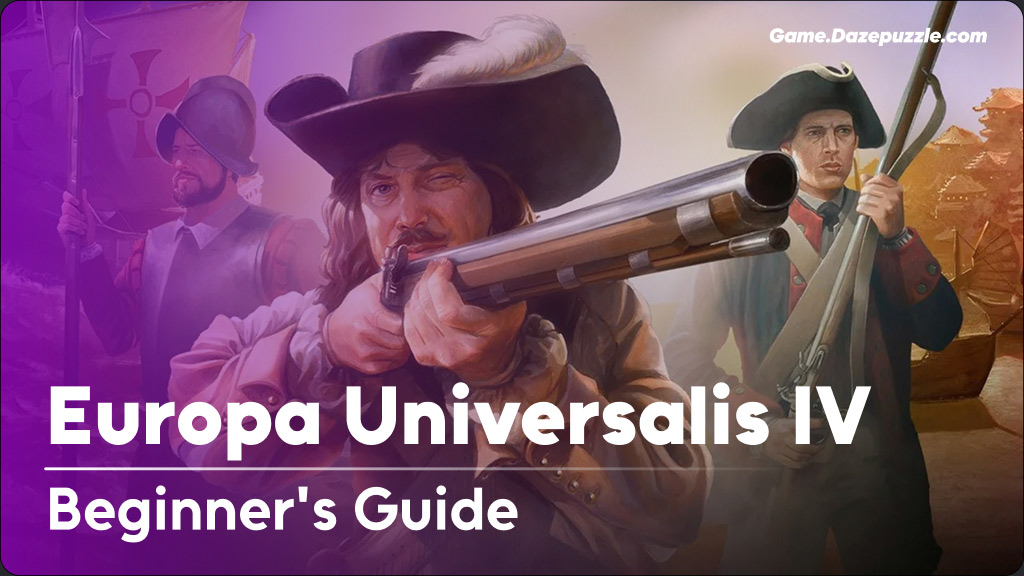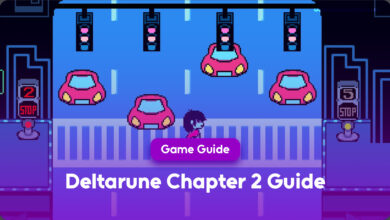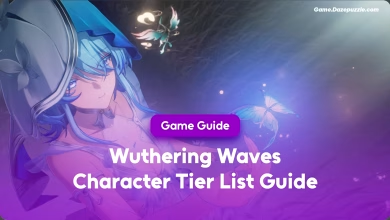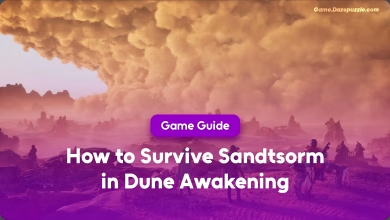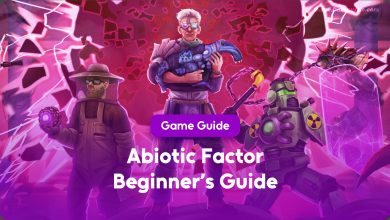So, you’ve decided to dive into the grand strategy world of Europa Universalis IV (EU4)? Awesome! This game lets you take control of a nation between 1444 and 1821 and guide it through centuries of war, diplomacy, trade, and colonization. Sounds epic, right? It is! But let’s be real, it can also feel like trying to understand ancient alien technology at first. That’s where this guide comes in. We’ll break down the basics so you can start painting the map your color without immediately wanting to uninstall.
So, You Wanna Rule the World? Your First Steps in Europa Universalis 4
So, you’ve decided to dive into the grand strategy world of Europa Universalis IV (EU4)? Awesome! This game lets you take control of a nation between 1444 and 1821 and guide it through centuries of war, diplomacy, trade, and colonization. Sounds epic, right? It is! But let’s be real, it can also feel like trying to understand ancient alien technology at first. That’s where this guide comes in. We’ll break down the basics so you can start painting the map your color without immediately wanting to uninstall.
What Exactly IS Europa Universalis IV Anyway?
Imagine a giant sandbox filled with historical nations. You pick one, and then you make decisions that shape its destiny. Will you build a massive empire through conquest? Focus on becoming a wealthy trading power? Or maybe just try to survive the backstabbing politics of the Holy Roman Empire? EU4 gives you the tools to do all of that and more. It’s a game about long-term planning, strategic thinking, and sometimes, just a little bit of luck.
Why Should YOU Play EU4?
Because it’s incredibly rewarding! There’s nothing quite like taking a small, insignificant country and turning it into a global superpower. Plus, you get to learn a ton about history (even if you end up rewriting it completely). Each game is a unique story, full of unexpected twists and turns. And let’s be honest, who hasn’t dreamed of leading their favorite historical nation to glory?
Getting Your Bearings: The Interface Explained
Okay, let’s look at the game screen. It can seem overwhelming at first, but don’t panic! Here are the key areas you need to know about.
The Top Bar: Your Nation’s Vital Stats
At the very top, you’ll see a bunch of numbers and icons. These tell you the most important things about your country right now.
- Ducats (Money): You’ll need this to build stuff, raise armies, and generally keep your nation running.
- Manpower: This represents the number of soldiers you can recruit. If it hits zero, you’re in trouble!
- Sailors: Needed for your ships. No sailors, no navy!
- Stability: A high stability means your country is chill and happy. Low stability can lead to rebellions and other nasty stuff.
- Corruption: This is bad. It drains your money and slows down progress. You want to keep this as low as possible.
- Prestige: How respected your nation is on the world stage. High prestige helps with diplomacy.
- Legitimacy/Devotion/Horde Unity/Tribal Authority/Republican Tradition: This depends on your government type, but it basically tells you how stable and effective your leadership is.
- Power Projection: Doing cool stuff like having strong rivals or dominating trade gives you power projection, which grants various bonuses.
Next to these, you’ll see three important numbers: Administrative, Diplomatic, and Military Power. These are like your royal “mana” and are used for tons of things, from researching new technologies to developing your provinces.
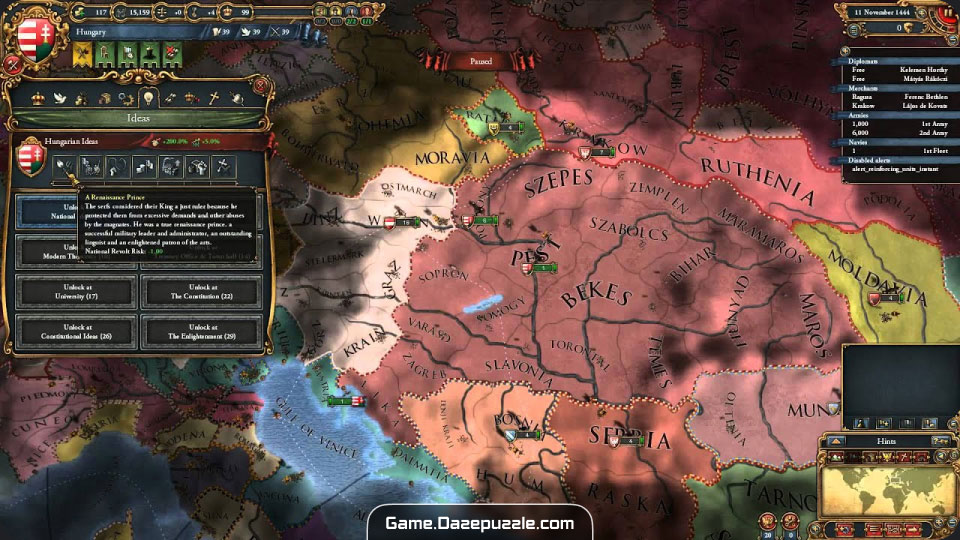
The Map: Your Playground (and Battleground)
The big map in the middle is where all the action happens. It’s divided into provinces, which are the basic units of territory in the game. Each province has its own culture, religion, development level, and trade goods. You can switch between different map modes (political, trade, religion, etc.) to see different kinds of information about the world.
Important Buttons and Menus
Look for your nation’s flag – clicking on it opens up a summary of your country. You’ll also find buttons for things like:
- Technology: Where you spend your monarch power to unlock new advancements.
- Ideas: Special sets of national ambitions that give you powerful bonuses.
- Diplomacy: Where you manage your relationships with other countries.
- Economy: An overview of your income and expenses.
- Military: For recruiting armies, building ships, and managing your forces.
- Estates: These are powerful internal groups (like nobles and clergy) that you need to keep happy (mostly).
- Missions: Often gives you objectives to pursue with nice rewards.
Don’t be afraid to click around and see what everything does! Just remember to pause the game (spacebar) if things start happening too fast.
You might also like this: Top 10 Free Steam Games in 2025 that You Can’t Miss!
Core Concepts Every Beginner Needs to Know
Alright, let’s dive into some of the most important concepts you’ll encounter in EU4.
Monarch Power: Your Royal Fuel
As mentioned earlier, Administrative, Diplomatic, and Military power are crucial. You get them every month based on your ruler’s skills and any advisors you’ve hired. Spend them wisely! Here’s a quick rundown:
| Monarch Power | What It’s Used For |
|---|---|
| Administrative | Developing provinces, core territory, administrative tech, idea groups |
| Diplomatic | Improving relations, annexing vassals, diplomatic tech, idea groups |
| Military | Recruiting generals, suppressing rebels, military tech, idea groups |
It’s generally a good idea to focus on keeping up with technology in all three areas. Falling behind in tech can have serious consequences, especially in warfare.
Estates: Keeping the Nobles (and Clergy, and Burghers) Happy
Estates are powerful groups within your nation that can give you significant bonuses if you manage them correctly. The main ones are usually the Nobility, the Clergy, and the Burghers. You can grant them privileges (special rights) that give you things like more manpower, tax income, or trade power. However, giving them too much power can lead to trouble, so it’s a balancing act. Pay attention to their loyalty and influence!
Economy and Trade: Making the Ducats Flow
Money makes the world (and your nation) go round in EU4. Your main sources of income are:
- Taxes: From the provinces you control.
- Production: Based on the goods produced in your provinces (like grain, cloth, or iron).
- Trade: This can be a bit complex, but basically, you want to control valuable trade routes and steer that wealth back to your coffers. Building trade buildings in centers of trade can significantly boost your trade income.
Keeping your economy healthy is vital for funding your armies and development.
Warfare 101: From Zero to Hero (or at Least Not Zero)
At some point, you’re probably going to end up in a war. Here are a few basics:
- Manpower: Your pool of available soldiers.
- Army Composition: Different types of units (infantry, cavalry, artillery) have different strengths and weaknesses. As technology advances, the ideal army composition will change.
- Generals: Hiring a good general can make a big difference in battles. Look for those with high “pips” in fire, shock, and siege.
- Terrain: Fighting on mountains or across rivers gives the defender a big advantage.
- Casus Belli: You need a valid reason to declare war (a “casus belli”). Otherwise, other nations will get angry at you.
Don’t be afraid to lose a few battles while you’re learning. It happens to everyone!
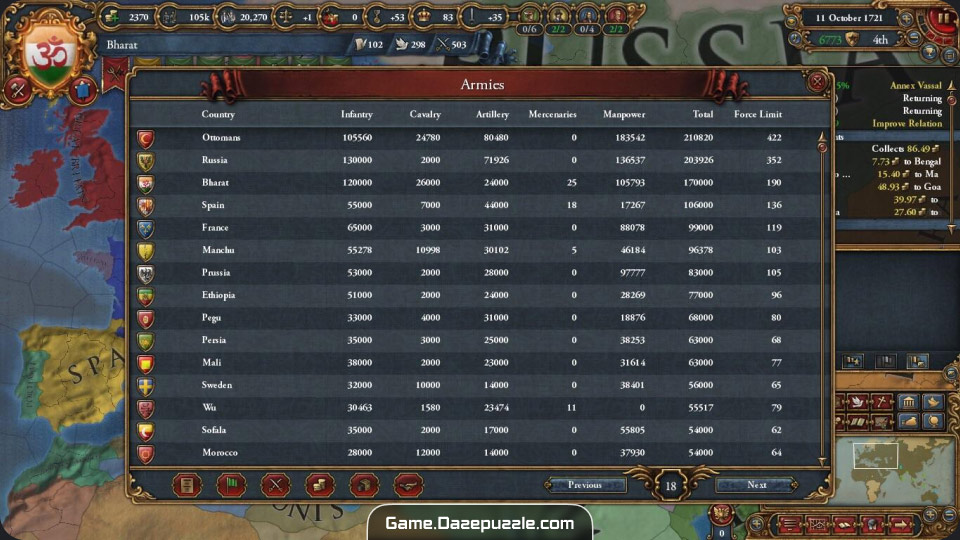
Diplomacy: Making Friends and Influencing Nations (or Just Surviving)
Diplomacy is all about managing your relationships with other countries. You can:
- Form Alliances: Team up with other nations for mutual defense or to help you in wars.
- Arrange Royal Marriages: Improve relations and potentially form personal unions (where you inherit another country!).
- Improve Relations: Make other countries like you more.
- Set Rivals: Identify nations you expect to clash with. Having rivals gives you bonuses.
- Vassalize: Make a smaller nation your subordinate.
Making strong alliances is often key to survival, especially in the early game.
Tech and Ideas: Leveling Up Your Country
Throughout the game, you’ll spend your monarch power to advance in technology. There are three main tech trees: Administrative, Diplomatic, and Military. Staying up-to-date in these areas unlocks new units, buildings, and other benefits.
Idea groups represent national focuses that give you powerful bonuses. For example, an “Expansion” idea group might give you bonuses to colonization, while a “Trade” idea group will boost your economy. Choosing the right idea groups for your nation’s goals is crucial for long-term success.
Picking Your First Nation: Easy Starts for New Players
Choosing the right nation for your first game can make a big difference in your learning experience. Here are a few commonly recommended options:
- The Ottoman Empire: Starts big, has a strong military, and lots of easy targets for expansion. They are generally considered very forgiving for beginners.
- Portugal: Has a relatively safe starting position and lots of opportunities for exploration and colonization. They also usually have a strong alliance with England.
- France: A powerful nation with a good starting position and lots of options for different playstyles. They can be a bit more complex than the Ottomans or Portugal, though.
- Castile (can form Spain): Another strong contender with opportunities for colonization and European expansion.
Generally, it’s best to avoid smaller, more challenging nations for your first playthrough.
Pro Tips for New Europa Universalis 4 Players
Here’s some extra advice to help you on your way:
Set Small Goals: Baby Steps to World Domination
Don’t try to conquer the entire world in your first game! Focus on smaller, achievable goals, like completing your nation’s starting missions or conquering a specific nearby region. This will help you learn the different aspects of the game gradually.
Read Events Carefully: Your Choices Matter!
EU4 is full of random events that can have a big impact on your game. Always read them carefully and think about the long-term consequences of your choices.
Explore the Game: Knowledge is Power
Don’t be afraid to hover your mouse over things in the game interface. Tooltips will often give you detailed explanations of what everything does. Click on other countries to see their stats and relationships. The more you explore, the more you’ll learn.
Don’t Be Afraid to Pause: Take Your Time!
The game clock can run pretty fast, especially when wars are happening. Don’t hesitate to hit the spacebar to pause the game and think about your next move.
Save Often: Trust Us on This One
Seriously, save your game frequently. You never know when disaster might strike (like a massive rebellion or a surprise war).
Final Thoughts: You Got This!
Europa Universalis IV has a steep learning curve, but it’s also an incredibly rewarding game. Don’t get discouraged if you make mistakes – everyone does! Just keep learning, experimenting, and most importantly, have fun rewriting history your way. Good luck, and may your reign be long and prosperous!

